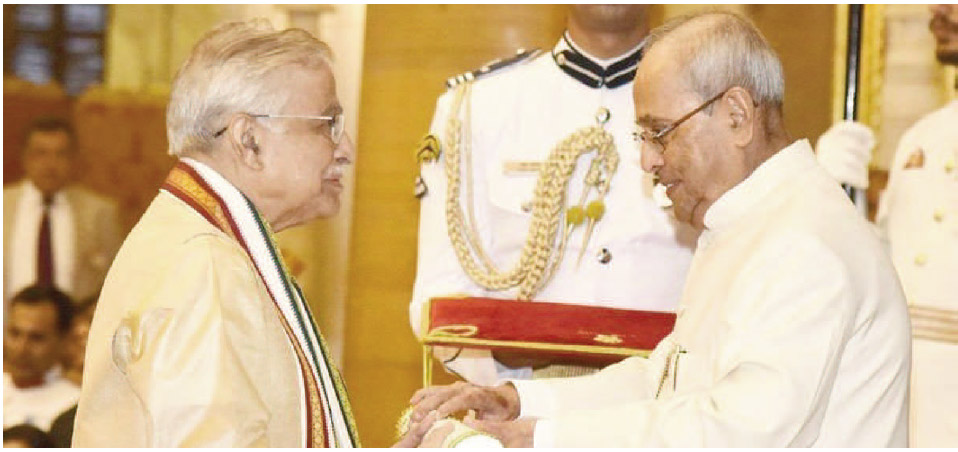A scholarly statesman
to watch !
 Eminent parliamentarian Dr. Murli Manohar Joshi receiving Padma Vibhushan from President Pranab Mukherjee
Eminent parliamentarian Dr. Murli Manohar Joshi receiving Padma Vibhushan from President Pranab Mukherjee
Power Politics Bureau
As President Pranab Mukherjee
looks all set to retire, speculation
is rife as to who would be his
successor in the Rashtrapati
Bhawan . Veteran Bharatiya
Janata Party patriarch L. K .
Advani apart, one of the most probable
names doing the rounds in this race is Dr
Murli Manohar Joshi .
It is believed that the Dr Joshi is the choice
of Rashtriya Swayam Sangh chief Mohan
Bhagwat. The RSS has a considerable
ideological influence on the present
Bharatiya Janata Party-led National
Democratic Alliance Government. Prime
Minister Narendra Modi has been a product of the RSS. He is likely to appreciate the
presidential choice of Bhagwat.
Besides, Dr Joshi deserves to be in this
highest office on his own merit. President
Mukherjee conferred on him the prestigious
Padma Bibhushan Award last month. An
internationally acclaimed scientist, teacher,
politician and activist , Dr Joshi has rendered
enormous contribution to the development of
India.
Under the previous NDA Government led
by Prime Minister Atal Bihari Vajpayee, Dr
Joshi was a Union Minister in charge of three
crucial ministries--- Human Resource
Development (HRD), Science and technology
(S&T) and Ocean Development. He was responsible for inserting Art. 21 A in the
Indian Constitution . This Article provides
"free and compulsory education" to all
children between 6 to 14 years as a
fundamental right. It has resulted in a sharp
increase in the enrolment of the children,
particularly girls, belonging to the deprived
sections of society and helped reduce the
gender gap in education .
He also took measures for the expansion of
higher and technical quality education. Indian
Institutes of Information Technology, IIIT and
IIIT(M) were established and the intake of
engineering and IT courses increased almost
threefold. In Science and Technology new
institutions like Brain Research Centre
came up.
Dr Joshi's international interaction resulted
in the formation of Indo-US-Science
Foundation. He launched schemes for linking
computer training with the studies of Sanskrit
and Urdu . A Central Scheme for Madrasa
modernization was launched by providing
Science and Maths teachers to the Madrasas.
Dr. Joshi has chaired a large number of
International Conferences and has been
invited to address various international fora.
He chaired Commonwealth Science Council
Ministerial Gathering, South Africa, 2002;
UNESCO Conference on 'Education for All', in
India Nepal, China and Nigeria; UNESCOsponsored
International Conference on
'Dialogue Among Civilizations', Delhi, 2003;
Third World Academy Conference, New Delhi;
Climate Change Conference, New Delhi;
International Conference on Mapping,
Bangkok and London.
Dr. Joshi addressed 'Second Parliament of
Science, Religion and Philosophy' at the World
Philosophers Meet on Science, Spirituality
and Development, Geneva, 1998. He
delivered 'Eighth Bose-Einstein Lecture on
Science, Technology and Environment' in
1998, 'Sustainable Consumption' as an
alternate model, Bonn University, Germany,
St. Petersburg, 2000, and Brazil Academy of
Science, Rio-de-Janerio, 2001; International
Conference on "Sanskrit in Asia : Unity in
Diversity", Bangkok (Thailand), June, 2005;
International Conference on "Dialogue of
Cultures and Civilizations in the Global
World", St. Petersburg, May, 2007; "Dialogue
of Cultures and Partnership of Civilizations:
Making of Global Culture", St. Petersburg,
May 2010; International Seminar on 'Science
and Religion,' Washington, 1993; and
European Research Council at Brussels in
2002.
The awards and honours Dr Joshi received
include : 'Jawaharlal Nehru Award in Science'
by Indian Science Association, 1999 and 'Life
Time Award' by the Indian Science Congress,
2004; 'Nicolay Rerikh Medal' by International
Academy of Ecology, Man and Nature
Protection Sciences, St. Petersburg, Russia;
'National Citizens Award' India, 2001.
Dr Joshi received the 'Outstanding
Parliamentarian' Award in 2009. He has
always been committed to the values of
composite culture and democracy. He
participated in the J.P. movement for
Samagra Kranti and was detained under
M.I.S.A. during Emergency (June 1975-- March
1977. As President of B.J.P., he undertook
Ekta Yatra from Kanyakumari to Srinagar to
highlight the Pakistan-sponsored terrorism in
Kashmir and hoisted National Flag at Lal
Chowk, Srinagar, Jammu and Kashmir on the
Republic Day, 1992.
Looking back, the Indian presidency is a
unique political institution. It is a great
symbol of our Republic. Dr Joshi is cast in the
scholarly mould of some of our finest
Presidents like Dr S Radhakrishnan and Dr
Zakir Hussein. He is a value-based scholarly
statesman. He can be seen as a symbol of
new India in the totality of its composite
culture. Hopefully , Prime Minister Modi, who
is currently riding high as the most popular
leader in India, would endorse Dr Joshi as the
ruling party's choice to adorn the office of the
country's next President .




